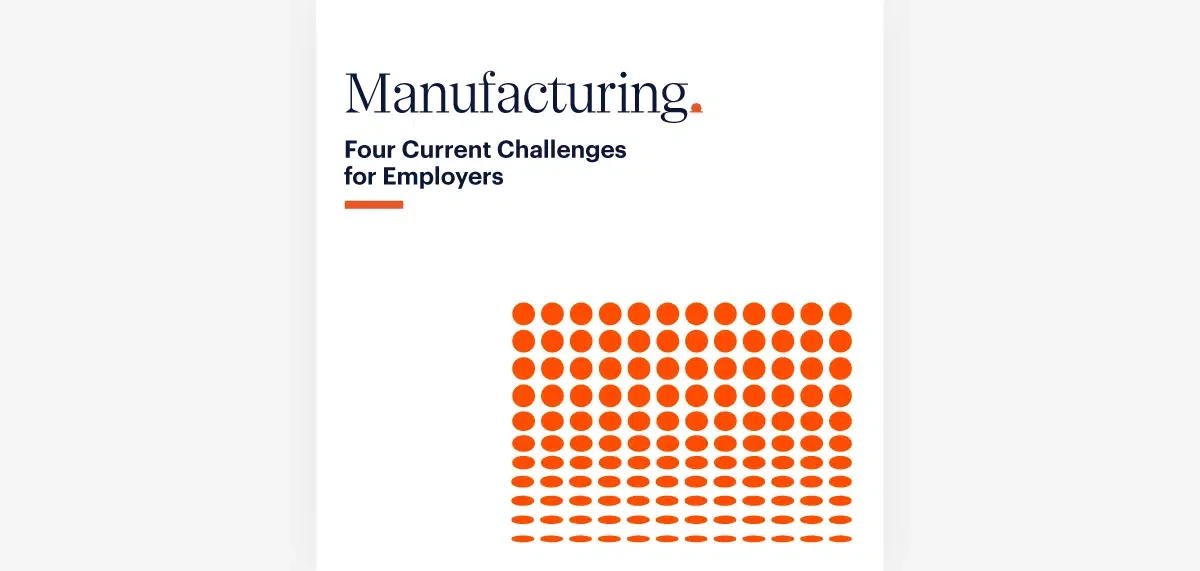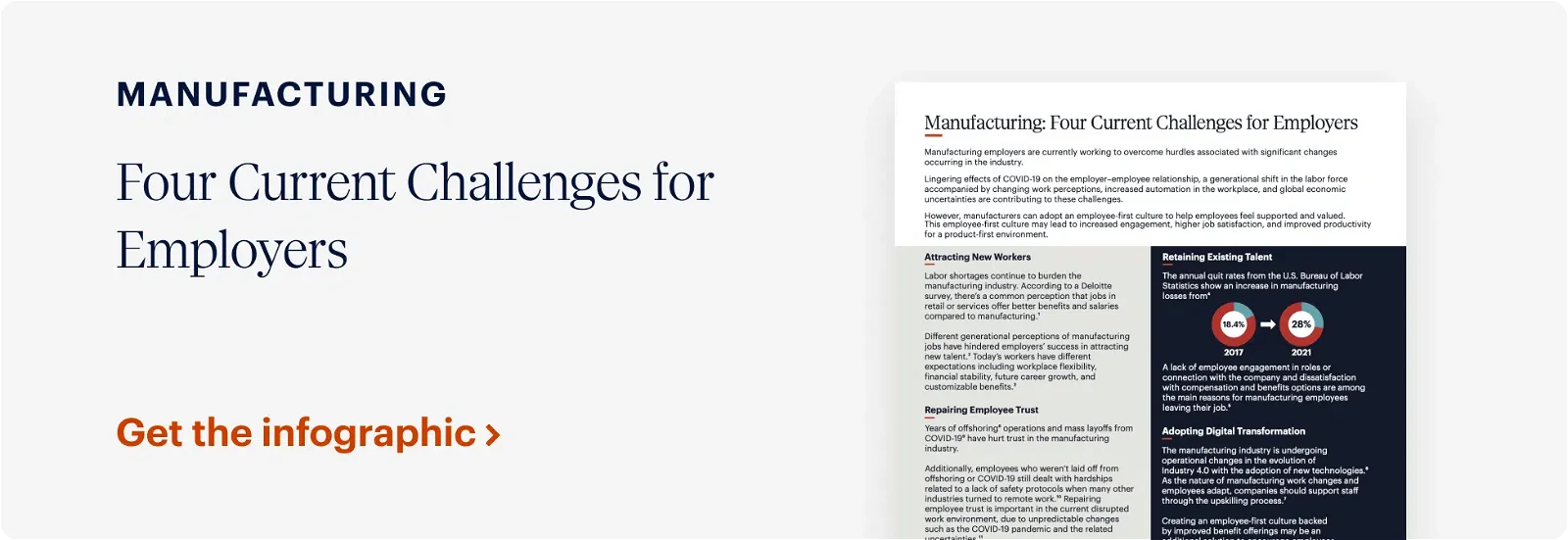Putting Employees First Can Help Manufacturing Companies Overcome Staffing Challenges
Added Benefits Like On-Demand Pay Improve Hiring and Retention
The manufacturing industry is making headlines lately thanks to a recent boom in new jobs. Over the next two years, experts predict the industry to add between 200,000 and 250,000 new manufacturing jobs in the United States.1
Despite this optimistic outlook, there may still be workforce challenges ahead. A small labor pool will continue to affect manufacturing companies looking to fill these roles.2
Manufacturing leaders must adapt their company cultures and continue to evolve benefit offerings to put them in the best position to hire and retain employees.
Employees are the backbone of manufacturing operations, so a skilled and engaged team is vital to success. Employers should demonstrate a commitment to their employees with valuable benefits that prove companies are invested in the long-term financial wellness of employees.
Highly skilled workers keep production lines moving and factories bustling. Without the right people on the line, your plant simply isn’t going to run as effectively as possible.
Let’s take a look at some of the challenges facing manufacturing employers today.
Manufacturing Companies Are Dealing With a Smaller Labor Pool
Despite new incentives from the federal government to support the manufacturing industry, a tight labor market is still standing in the way of success.3 Staffing shortages are expected to continue as manufacturers look for skilled employees to fill highly specialized positions.
According to a recent Manufacturers’ Outlook Survey from the National Association of Manufacturers, over 75% of respondents listed attracting and retaining a quality workforce as a primary business challenge — higher than supply chain challenges (65.7%) and increased raw material costs (60.7%).4
Manufacturers Face Tough Competition From Other Industries
Aside from the small labor pool, competition from other industries isn’t helping manufacturers.
In a recent study by Deloitte and The Manufacturing Institute, respondents suggested that they see high-growth industries (such as retail or services) as having better salaries and benefits than jobs in manufacturing.5
This perception is aiding well-known brands outside of the manufacturing sector to attract employees at the local market level, with companies like Amazon, Walmart and Target paying more for entry-level talent.6 In that same Deloitte study, 58% of surveyed respondents felt manufacturing jobs have limited career prospects.
Employee Turnover Is Widening the Skills Gap
A healthy talent pipeline requires an available supply of entry-level, local talent to replace those who leave.
Considering over 20% of current skilled manufacturing workers are estimated to retire by the end of 2025, paired with the struggles around hiring new talent with the departure of these skilled workers, the manufacturing industry is dealing with a skills gap.7
A very low unemployment rate in manufacturing (less than 3% for 4/23–7/23) reinforces how in-demand these workers are across the industry — and why it is critical to retain the workers on hand.8
Promote Financial Wellness to Attract, Engage and Retain Employees
Manufacturers must elevate their pay strategies to maintain adequate staffing levels that can keep operations running and meet production goals.
In an October 2022 article, McKinsey noted that unfilled jobs were a primary reason that seven in ten companies fell behind in scheduled production.9
Employing a stable, motivated workforce isn’t just a luxury — it’s a necessity. Adopting innovative pay strategies like on-demand pay can make the difference between keeping a skilled employee motivated or watching them walk away in search of better financial stability elsewhere.
Rewarding employees with a robust pay strategy can help create an environment where employees feel valued, where their financial needs are met promptly and where they can see a direct relationship between their efforts and rewards.
In an age where the war for talent is more intense than ever, manufacturers can’t afford to overlook the strategic importance of their compensation models. By delivering an on-demand pay benefit, manufacturers can give employees what they’re looking for and make their employees feel supported and valued.
Ready to see how DailyPay drives value for your business?
All information herein is for educational purposes only and should not be relied upon for any other use. The information herein does not constitute the rendering of financial, business, accounting, securities, tax, legal or professional advice by DailyPay. No fiduciary obligation or duty exists or is created, between you and DailyPay. DailyPay does not warrant the completeness or accuracy of any information provided to you.
1 https://www.axios.com/2023/08/21/manufacturing-job-boom-semiconductor-renewable-energy:DailyPay, 2020
2 https://www.axios.com/2023/08/02/us-labor-shortage-biden-manufacturing-jobs :DailyPay, 2020
3 https://www.axios.com/2023/08/02/us-labor-shortage-biden-manufacturing-jobs :DailyPay, 2020
4 https://www.nam.org/manufacturers-concerned-of-recession-threat-in-2023-20054/?stream=series-press-releases:DailyPay, 2020
5 https://www2.deloitte.com/xe/en/insights/industry/manufacturing/competing-for-manufacturing-talent.html :DailyPay, 2020
6 https://www.manufacturingdive.com/news/labor-shortage-manufacturing-outlook-2023-production-engineering-technicians/640552/ :DailyPay, 2020
7 https://hbkcpa.com/labor-shortages-in-the-manufacturing-sector/#:~:text=The%20fact%20is%20that%2022,unfilled%20manufacturing%20jobs%20by%202025. :DailyPay, 2020
8 https://www.bls.gov/iag/tgs/iag31-33.htm :DailyPay, 2020
More for Manufacturing
Learn how on-demand pay may address top challenges across the industry.














